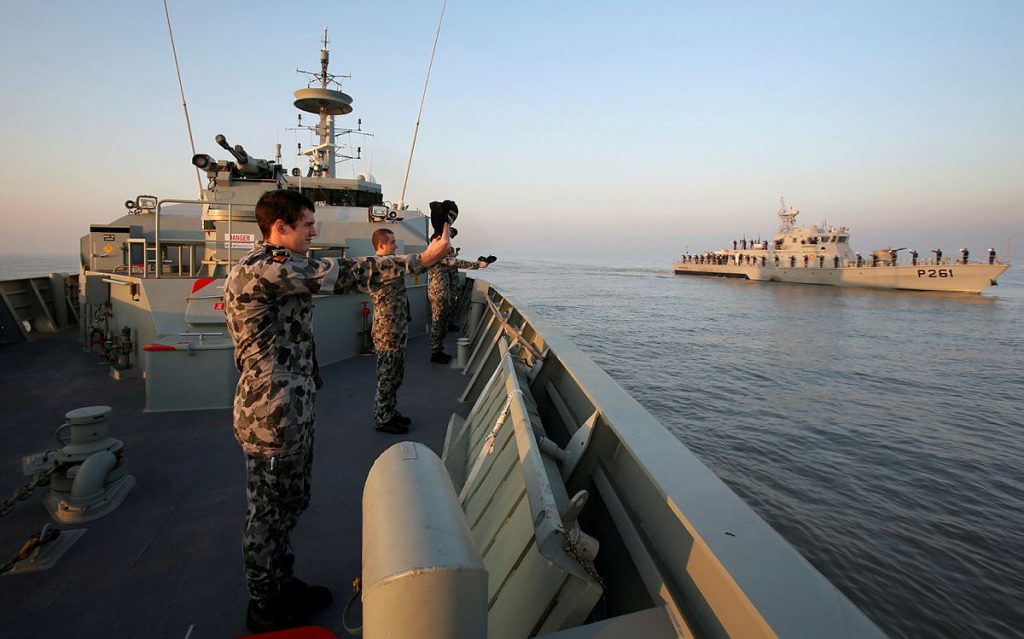
Australia’s 2020 defence strategic update identifies the northeast Indian Ocean as a priority area as part of our immediate region, but it’s also where our security relationships are the least developed. A new report published by the National Security College examines Australia’s interests in that region and options for enhanced security relations with Bangladesh.
For at least a decade, Australia has rightly concentrated on India as its key South Asian partner, but it is now time to broaden that strategy to include other countries in that region. Enhanced security, political and economic relations with Bangladesh should be part of that. Despite being one of the first countries to recognise an independent Bangladesh, Australia has not properly developed the relationship.
Improved connections with Bangladesh would also be part of a developing web of relationships with existing and emerging middle powers across the Indo-Pacific. These can supplement relationships with major powers and, potentially, also help mitigate some of the impacts of major power competition.
Australia has significant strategic equities in Bangladesh, reflecting economic opportunities and potential threats emanating from the northeast Indian Ocean.
Bangladesh is one of the big economic success stories in Asia. Over the past several decades, Bangladesh has grown from one of the poorest countries in the world to a middle-income country. In the years prior to the Covid-19 crisis, its economic growth averaged around 7% to 8% per annum. It could well become one of Asia’s new economic ‘tigers’ and a key trading partner for Australia.
It’s in our interests to support a stable and independent Bangladesh as it pursues development while balancing external pressures. Bangladesh is located at the fulcrum of the Bay of Bengal, between India and China, and is the subject of growing strategic competition between them. Recent threats by the Chinese ambassador if Bangladesh dared to develop relations with the Quad will likely be shrugged off by Dhaka. Indeed, such bullying may only further highlight the value for Dhaka of building partnerships with countries like Australia and Japan that can add further ballast to Bangladesh’s regional relationships.
Australia also has other security interests in the region, including in managing risks of climate change, people and drug smuggling and violent extremism, all of which could have a significant impact on Australia.
The ethnic cleansing of Rohingya people from Myanmar has resulted in more than 1 million refugees in Bangladeshi camps, creating risks from unregulated population movements and violent extremism.
Climate change, including sea-level rise and severe weather events, may also have a major impact on Bangladesh in coming years, potentially triggering large-scale population movements and regional instability.
Extended civil unrest in Myanmar also creates risks of a surge in drug smuggling or refugee movements. Myanmar is already Australia’s largest source of opium and now methamphetamines, and a breakdown in order could flood those drugs onto the Australian market.
Australia may increasingly need Bangladesh as a regional partner to help address these threats. But our security relationship is very thin. Official military visits are rare and there is no resident defence representative. But Bangladesh has recently flagged its interest in developing closer security relations as part of a more comprehensive relationship with Australia.
Much can be done to kick-start engagement at minimal cost. Australia can start by focusing on low-hanging fruit, building relationships between the defence forces, building Bangladesh’s maritime security capabilities in selected areas and seeking opportunities for collaborative regional engagement.
Bangladesh has a large, professional and well-funded military. Although it has a democratic civilian-led government, the armed forces play a prominent role in public affairs. Good relationships across the Bangladeshi military are not only essential for defence cooperation, but are also a valuable element in broader political engagement.
Current arrangements for servicing the relationship through Australia’s defence adviser in Colombo are far from optimal. Australia needs a defence representative on the ground to have credibility, fully engage with the Bangladeshi military and explore further opportunities. This should include opportunities as a potential supplier in niche defence technologies or surplus equipment in light of Bangladesh’s military modernisation program. A resident defence adviser would also improve Australia’s visibility of security developments in the region.
Australia has long used military education to develop relationships with regional partners. We should provide opportunities (including on a paid basis) for senior Bangladeshi officers at the Australian War College, the National Security College or the Australian National Centre for Ocean Resources and Security. Networks could also be developed through targeted exchanges of personnel, for example, between the Bangladeshi and Australian peacekeeping training centres.
A port visit by one or more Australian naval ships could be undertaken as part of a future Indo-Pacific Endeavour activity in the northeast Indian Ocean.
Australia should undertake targeted capability-building activities with Bangladesh on selected maritime security issues where Australia has direct interests. These should focus on playing to Australia’s strengths in experience and expertise, in areas such as maritime domain awareness, search and rescue, and port security, where Australia can provide valuable expertise and training.
Bangladesh’s assumption of chair of the Indian Ocean Rim Association in 2021 provides an opportunity to collaborate on regional initiatives in maritime safety and security, the blue economy and environmental security. BIMSTEC, the regional political grouping in the northeast Indian Ocean, could also be a useful vehicle to demonstrate Australia’s renewed interest in the region.
India is without doubt Australia’s most important partner in South Asia and has been one of Australia’s key foreign policy focuses for some years. But India’s smaller neighbours also have important roles to play as we consider opportunities and risks in the region. An improved relationship with Bangladesh can provide valuable heft to regional relationships and additional options for Australia.

